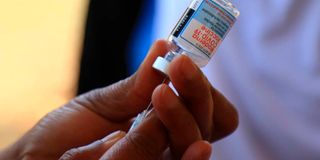Doc, can a Covid-19 vaccine affect my fertility?

What you need to know:
- It is good to note that sexual performance can be affected by many other factors, including anxiety about Covid-19 infection and the vaccine, stress, fear/worry, psychological problems, physical illness, relationship challenges, alcoholism among others.
- In case of recurrent challenges with sexual performance, it is advisable to visit a doctor and/or psychologist for evaluation and management.
Dear doctor,
I am yet to get the Covid-19 vaccine because I am worried about my fertility. Is it true that it reduces men’s performance and makes women infertile? Kindly advise
K
Dear K,
Several studies have shown that the current Covid-19 vaccines do not reduce the chances of achieving or carrying a pregnancy, with no negative effect on fertility reported in men or women.
A small study in Miami showed a slight increase in sperm counts in healthy men after vaccination.
A few women have reported menstrual changes such as delay in the cycle, heavier bleeding or break through bleeding.
However, these changes are minor and temporary – there is return to normal within one or two menstrual cycles. If the menstrual abnormalities persist, or if there were challenges with the menstrual cycle even before vaccination, it is advisable to visit a gynaecologist for further management.
It is good to note that sexual performance can be affected by many other factors, including anxiety about Covid-19 infection and the vaccine, stress, fear/worry, psychological problems, physical illness, relationship challenges, alcoholism among others. In case of recurrent challenges with sexual performance, it is advisable to visit a doctor and/or psychologist for evaluation and management. On the other hand, Covid-19 disease can affect male fertility for about 60 days following infection.
This may be due to having fever during the infection, which can affect sperm production.
It may also be due to tissue inflammation in the male reproductive organs and erectile dysfunction. Pregnancy in some cases poses a higher risk of severe Covid disease for the mother.
The coronavirus vaccination actually protects against the temporary reduction in fertility for men and pregnancy risk in Covid disease.
The lungs are vital body organs, helping us breath. How can one keep them healthy and ensure these organs do not get ailments such as bronchitis, asthma, Covid-19, cancer, and other respiratory diseases?
Ali, Nairobi
Dear Ali,
The lungs are part of the respiratory system, whose purpose is to help you breath.
All cells in the body need oxygen and produce carbon dioxide as a waste gas. When you breathe in, the lungs remove oxygen from the breathed-in air, and this oxygen passes into the blood stream and is supplied to each cell.
The waste gas carbon dioxide is then released from the cells into the bloodstream, which carries it back to the lungs and is removed from the body when you breathe out. This process is essential for life, and therefore the health of the lungs is vital.
It is impossible to completely prevent lung infections, inflammatory conditions like chronic bronchitis and asthma or cancer, but there are measures that can be taken to optimise lung health.
One is to engage in regular exercise so as to make the lungs more efficient, which also helps to delay the detrimental effects of aging on lung health and the effects of lung diseases.
Another is to regularly perform deep breathing exercise. Also avoid exposure to pollutants and irritants like smoke (cigarettes, charcoal, wood, other fuel), mold, dust, synthetic air fresheners and harsh cleaning products.
Make sure your living space is always well ventilated. In addition, you can prevent infections by maintaining good general health, eating lots of fruits and vegetables, staying well hydrated, practising hand hygiene, avoiding crowded places, getting vaccinated, and early treatment of illness.
To prevent Covid-19, practise social distancing, wear a mask, practise hand hygiene and get vaccinated.
Dear Doctor,
My mother is 69 years old, and she has been having recurrent abdominal pain, headache, chest pain and fatigue for the last two months. She visited hospital where blood tests and chest x-ray were done, which were reported as normal. She was not given a specific diagnosis but she got antibiotics and painkillers. I am wondering if these could be the effects of Covid- 19 as she had previously contracted it before the symptoms began.
Mercy
Dear Mercy,
Some people have symptoms resulting from Covid infection that last for weeks or months after the infection has cleared.
These symptoms include headaches, chest pain, abdominal pain, diarrhoea, joint or muscle pain, fatigue, difficulty thinking or concentrating, palpitations, sleep problems, dizziness, shortness of breath, skin rash, changes in smell or taste, mood changes and changes in the menstrual cycle.
The long term effects of Covid can happen to anyone, though they are more common in the elderly, in women, in those who have asthma, smokers, if overweight or obese or if there was severe Covid disease.
These symptoms are managed through supportive treatment as they have no known cure so far. The only way to avoid these symptoms is to avoid Covid infection through vaccination and observing infection prevention protocols.
However, your mother may also have a different problem ongoing, and it would be good for her to get a thorough examination by a physician, including blood, urine and stool tests and necessary scans.
Send your health questions to [email protected]


